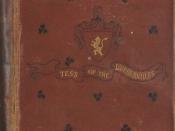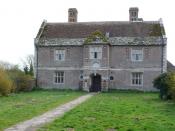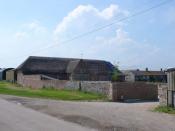The Victorian Era, the time in which the novel "Tess of the D'urbervilles" was composed, was a period in which industrialisation began to shape the face of England; a time of conflicting beliefs. These paradigms are critically reflected in Hardy's work, in which he explores the elements of hypocrisy within the patriarchal society, its values and attitudes towards religion, gender roles and class structure. These patriarchal models of the Victorian era are presented by Hardy's portrayal of the Durbeyfield household, the treatment of Tess by both Angel Clare and the main antagonist, Alec Stoke-D'urberville, while critical comments on religion and class structure of Victorian society is prevalent through character development and relations.
A complement to the patriarchy of Hardy's times is the subserviency of women in Tess. The female characters, Joan and Tess Durbeyfield, and the three dairymaids, Izz, Retty and Marian, are all subject to the whims, to differing extents, of the males in their lives.
Joan toils in her domesticity, while relying on her husband for her earthly sustenance. Tess is at the mercy of Alec many times, and each time he uses his position to his advantage until finally he robs her of her innocence at The Chase. Hardy comments on the perceptions of women held by Victorian society, and the expected submissive nature of the Victorian female. Tess, as a woman, could do nothing more than use harsh words to discourage Alec's behaviour, and had to bear it with ill grace.
At Talbothays, Tess, the vibrant and lively female who seems to challenge the Victorian image of women while resisting Alec, meets the exact specifications of a 19th Century woman. She is demure, chaste and carefully responsive to Angel's advances. The contrast between this Tess and the one previously portrayed at Trantridge is...


